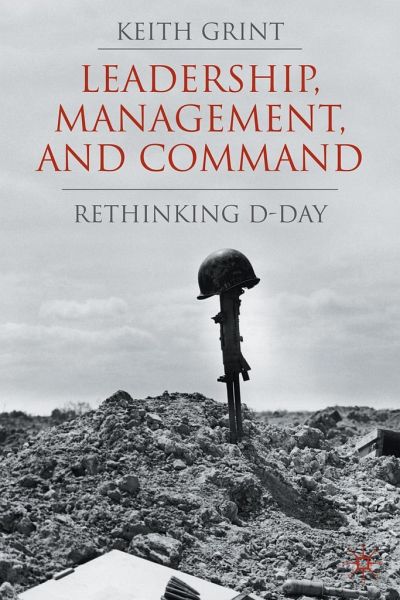
Versandkostenfrei!
Versandfertig in 6-10 Tagen
Weitere Ausgaben:

PAYBACK Punkte
35 °P sammeln!





The author argues that the successes and failures of D-Day, on both sides, cannot be explained by comparing the competing strategies of each side. Instead he provides an account of the battle through the overarching nature of the relationship between the leaders and their followers.
KEITH GRINT is Professor of Defence Leadership at Cranfield University, UK, and Deputy Principal (Leadership and Management) at the Defence College of Management and Leadership within the Defence Academy in Shrivenham. Previously he was Professor of Leadership Studies and Director of the Lancaster Leadership Centre at Lancaster University Management School. Before that he was Director of Research at the SaId Business School and Fellow in Organizational Behaviour, Templeton College, University of Oxford. Keith spent 10 years in industry before switching to an academic career. He is a founding co-editor of the journal Leadership, and founding co-organizer of the International Conference in Leadership Research. He remains a Visiting Research Professor at Lancaster, an Associate Fellow of the SaId Business School and Templeton College, Oxford, and a Fellow of the Sunningdale Institute, a research arm of the UK's National School of Government.
Produktdetails
- Verlag: Palgrave Macmillan / Palgrave Macmillan UK / Springer Palgrave Macmillan
- Artikelnr. des Verlages: 978-0-230-54317-1
- Seitenzahl: 503
- Erscheinungstermin: 17. November 2007
- Englisch
- Abmessung: 244mm x 167mm x 42mm
- Gewicht: 922g
- ISBN-13: 9780230543171
- ISBN-10: 0230543170
- Artikelnr.: 23067899
Herstellerkennzeichnung
Libri GmbH
Europaallee 1
36244 Bad Hersfeld
gpsr@libri.de
"Keith Grint consistently publishes leadership books that are important, insightful and invigorating - this book is no exception. It will
fascinate leadership scholars and military historians alike. In fact, it is a timely reminder of the power of combining erudite theoretical analysis with meticulous and highly contextualised historical research. Professor Grint skilfully crafts the timeless lessons that can be derived from the D-Day experience. My only hope is that these will be properly learned and heeded by political, military and business leaders so that we can all benefit from them." Dr Brad Jackson, Professor of Leadership, The University of Auckland Business School
'This is a fascinating and highly readable book
fascinate leadership scholars and military historians alike. In fact, it is a timely reminder of the power of combining erudite theoretical analysis with meticulous and highly contextualised historical research. Professor Grint skilfully crafts the timeless lessons that can be derived from the D-Day experience. My only hope is that these will be properly learned and heeded by political, military and business leaders so that we can all benefit from them." Dr Brad Jackson, Professor of Leadership, The University of Auckland Business School
'This is a fascinating and highly readable book
Mehr anzeigen
which re-examines D-Day through the lens of Wicked, Tame and Critical problems - a new language about the relationship between Leadership. Management and Command. The complex issues facing both the high command and junior commanders are explored in impressive and well researched detail. Highly recommended.' Alan Hooper, Founder, Centre for Leadership Studies, University of Exeter and former senior Royal Marines officer
'Why soldiers brave fields of fire - why they follow their leaders when they shout "let's go boys!" - is exactly the question for leaders in all walks of life. The people who come into our offices and factories and shops every day are in reality all volunteers and how much of themselves they give in return for thatpay check is something they very much decide. We don't "make them do it." Grint explores the seldom asked questions about leadership - why do people follow their leaders? His excellent and well documented D-Day case speaks to leaders in every walk of life - and makes a good, thoughtful read that contributes significantly to our understanding and our application of leadership.' Col Mike Harper, USA (Ret) Author and Leadership Consultant
'Why soldiers brave fields of fire - why they follow their leaders when they shout "let's go boys!" - is exactly the question for leaders in all walks of life. The people who come into our offices and factories and shops every day are in reality all volunteers and how much of themselves they give in return for thatpay check is something they very much decide. We don't "make them do it." Grint explores the seldom asked questions about leadership - why do people follow their leaders? His excellent and well documented D-Day case speaks to leaders in every walk of life - and makes a good, thoughtful read that contributes significantly to our understanding and our application of leadership.' Col Mike Harper, USA (Ret) Author and Leadership Consultant
Schließen
Für dieses Produkt wurde noch keine Bewertung abgegeben. Wir würden uns sehr freuen, wenn du die erste Bewertung schreibst!
Eine Bewertung schreiben
Eine Bewertung schreiben
Andere Kunden interessierten sich für













